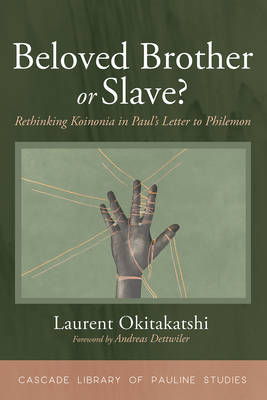
Bedankt voor het vertrouwen het afgelopen jaar! Om jou te bedanken bieden we GRATIS verzending (in België) aan op alles gedurende de hele maand januari.
- Afhalen na 1 uur in een winkel met voorraad
- In januari gratis thuislevering in België
- Ruim aanbod met 7 miljoen producten
Bedankt voor het vertrouwen het afgelopen jaar! Om jou te bedanken bieden we GRATIS verzending (in België) aan op alles gedurende de hele maand januari.
- Afhalen na 1 uur in een winkel met voorraad
- In januari gratis thuislevering in België
- Ruim aanbod met 7 miljoen producten
Zoeken
€ 40,45
+ 80 punten
Uitvoering
Omschrijving
Addressing Philemon as well as the church that meets in Philemon's house, Paul makes this prayer: "I pray that the koinonia of your faith may become effective when you realize all the good that we may do for Christ" (vv. 4-6). What was Paul's intention in revealing the content of his prayer for Philemon in a letter he knew would be read publicly? Why was Philemon's koinonia of faith both a matter of praise and an object of concern for Paul? The text does not answer these questions until ten verses later. In verse 16, one finds this radical and earth-shaking request, namely that Philemon receive Onesimus no longer as a slave but more than a slave, a beloved brother in the flesh and in the Lord (v. 16). This book stems from the realization that the word "brother" in verse 16 not only explains why Philemon's koinonia of faith was ineffective (v. 6) but also strengthens my claim that a call to an ethic of koinonia is the central message of the letter.
Specificaties
Betrokkenen
- Auteur(s):
- Uitgeverij:
Inhoud
- Aantal bladzijden:
- 218
- Taal:
- Engels
- Reeks:
Eigenschappen
- Productcode (EAN):
- 9798385217830
- Verschijningsdatum:
- 21/08/2025
- Uitvoering:
- Paperback
- Formaat:
- Trade paperback (VS)
- Afmetingen:
- 152 mm x 229 mm
- Gewicht:
- 299 g

Alleen bij Standaard Boekhandel
+ 80 punten op je klantenkaart van Standaard Boekhandel
Beoordelingen
We publiceren alleen reviews die voldoen aan de voorwaarden voor reviews. Bekijk onze voorwaarden voor reviews.









